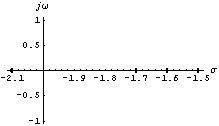|
5.1.1 The Recursive Algorithms
After transforming the given state-space system to the block controller-Hessenberg form  , the recursive algorithm constructs a block upper-triangular matrix , the recursive algorithm constructs a block upper-triangular matrix  and a block upper-bidiagonal matrix and a block upper-bidiagonal matrix  , whose diagonal blocks , whose diagonal blocks  , ,  , ..., , ...,  contain the eigenvalues to be assigned, such that contain the eigenvalues to be assigned, such that
 , where , where  and and  has full rank. has full rank.
The following steps are performed:
1. Set  . .
2. Compute the blocks  through through  of of  recursively as follows: recursively as follows:
2.1 Compute  . .
2.2 Find the RQ decomposition of  : :  . .
3. Compute the feedback matrix  by solving the linear system: by solving the linear system:
 . .

Option value for the recursive pole assignment method.
Although the recursive algorithm is the most efficient of all the algorithms, it is not necessarily numerically stable. In the single-input case, however, the algorithm has been proven to be numerically reliable (Arnold and Datta (1998)) in the sense that the ill-conditioning of the matrix  is an indicator of the breakdown of the algorithm. Both the single-input and multi-input algorithms have worked well in most test cases. The RQ version of the single-input algorithm is numerically stable (Arnold and Datta (1998)). is an indicator of the breakdown of the algorithm. Both the single-input and multi-input algorithms have worked well in most test cases. The RQ version of the single-input algorithm is numerically stable (Arnold and Datta (1998)).
Make sure the application is loaded.
In[1]:=
Load the collection of test examples.
In[2]:=
This is a model of an L-1011 aircraft.
In[3]:=
Out[3]=
Here are the desired poles, arbitrarily chosen.
In[4]:=
The multi-input recursive method gives the following feedback gain matrix.
In[5]:=
Out[5]=
This computes the norm of the feedback gain matrix.
In[6]:=
Out[6]=
Here are the computed closed-loop poles.
In[7]:=
Out[7]=
Make sure the function MultipleListPlot is available.
In[8]:=
This displays the closed-loop poles of the L-1011 aircraft model on the complex plane.
In[9]:=

|